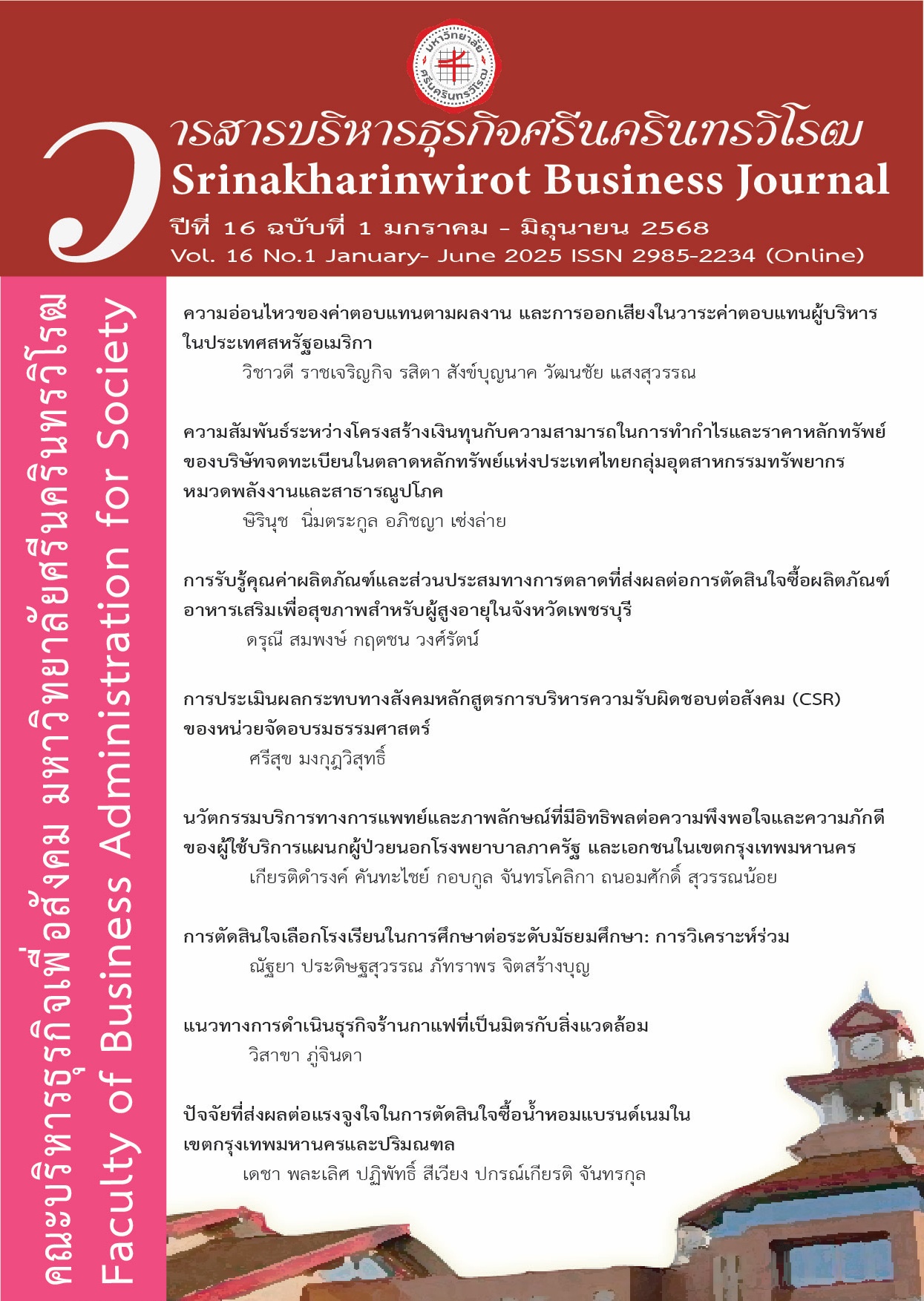PAY-PERFORMANCE SENSITIVITY AND SAY-ON-PAY ADVISORY VOTE IN THE UNITED STATES
Keywords:
Executive Compensation, Pay-Performance Sensitivity, Say-on-Pay Advisory VoteAbstract
Say-on-Pay Advisory vote in the United States requires shareholders to play an essential role in assessing executive pay packages and make decisions regarding the approval or disapproval of those pay packages by assessing through the indicator of pay-performance sensitivity (PPS). The pay package should be approved when the value of PPS is high and should be disapproved when the value of PPS is low or negative. However, several studies argue that too much PPS could lead to risk-averse executive decisions, which tend to negatively influence on firm performance in long run. This research aims to study whether shareholder disapproval votes on the executive pay package of S&P 1500 firms are associated with higher PPS. The research model shows the relationship between firm performance and executive pay, indicating PPS, in which the dummy variables, representing the sampled firms with significant increases of disapproval votes were added. Multilevel model analysis was employed in examining the relationship as to control for both fixed and random effects as well as the control variables, which were added as to control other important influences on executive pay. The findings show that the alternative argument with regard to too much pay-performance sensitivity has been incorporated in the Say-on-Pay votes, which can extend the strand of literature related to PPS and Say-on-Pay voting decisions and make a suggestion for shareholder in assessing executive pay packages.
References
Aggarwal, R. K., & Samwick, A. A. (1999). The other side of the trade-off: The impact of risk on executive compensation. Journal of Political Economy, 107(1), 65-105.
Amzaleg, Y., Azar, O. H., Ben-Zion, U., & Rosenfeld, A. (2014). CEO control, corporate performance and pay-performance sensitivity. Journal of Economic Behavior & Organization, 106, 166-174.
Armstrong, C. S., Gow, I. D., & Larcker, D. F. (2013). The efficacy of shareholder voting: Evidence from equity compensation plans. Journal of Accounting Research, 51(5), 909-950.
Balsam, S., Boone, J., Liu, H., & Yin, J. (2016). The impact of say-on-pay on executive compensation. Journal of Accounting and Public Policy, 35(2), 162-191.
Brick, I. E., Palmon, O., & Wald, J. K. (2012). Too Much Pay-Performance Sensitivity? The Review of Economics and Statistics, 94(1), 287-303. https://doi.org/10.1162/REST_a_00142
Brunarski, K. R., Campbell, T. C., & Harman, Y. S. (2015). Evidence on the outcome of Say-On-Pay votes: How managers, directors, and shareholders respond. Journal of Corporate Finance, 30, 132-149.
Chen, H., Jeter, D., & Yang, Y.-W. (2015). Pay-performance sensitivity before and after SOX. Journal of Accounting and Public Policy, 34(1), 52-73.
Clarkson, P. M., Walker, J., & Nicholls, S. (2011). Disclosure, shareholder oversight and the pay–performance link. Journal of Contemporary Accounting & Economics, 7(2), 47-64.
Core, J., & Guay, W. (2002). Estimating the value of employee stock option portfolios and their sensitivities to price and volatility. Journal of Accounting Research, 40(3), 613-630.
Core, J. E., Guay, W., & Larcker, D. F. (2008). The power of the pen and executive compensation. Journal of Financial Economics, 88(1), 1-25.
Core, J. E., Holthausen, R. W., & Larcker, D. F. (1999). Corporate governance, chief executive officer compensation, and firm performance. Journal of Financial Economics, 51(3), 371-406.
De Falco, S. E., Cucari, N., & Sorrentino, E. (2016). Voting dissent and corporate governance structures: The role of say on pay in a comparative analysis. Corporate Ownership & Control, 13(4), 188-196.
De Franco, G., Hope, O.-K., & Larocque, S. (2013). The effect of disclosure on the pay-performance relation. Journal of Accounting and Public Policy, 32(5), 319-341.
Del Guercio, D., Seery, L., & Woidtke, T. (2008). Do boards pay attention when institutional investor activists “just vote no”? Journal of Financial Economics, 90(1), 84-103.
Duffhues, P., & Kabir, R. (2008). Is the pay–performance relationship always positive?: Evidence from the Netherlands. Journal of Multinational Financial Management, 18(1), 45-60.
Fang, V. W., Noe, T. H., & Tice, S. (2009). Stock market liquidity and firm value. Journal of Financial Economics, 94(1), 150-169.
Ferri, F., & Maber, D. A. (2013). Say on pay votes and CEO compensation: Evidence from the UK. Review of Finance, 17(2), 527-563.
Fisch, J., Palia, D., & Solomon, S. D. (2018). Is say on pay all about pay: The impact of firm performance. Harvard Business Law Review, 8, 101.
Jensen, M. C., & Murphy, K. J. (1990). Performance pay and top-management incentives. Journal of Political Economy, 98(2), 225-264.
Kimbro, M. B., & Xu, D. (2016). Shareholders have a say in executive compensation: Evidence from say-on-pay in the United States. Journal of Accounting and Public Policy, 35(1), 19-42.
Liang, Y., Moroney, R., & Rankin, M. (2020). Say‐on‐pay judgements: The two‐strikes rule and the pay‐performance link. Accounting & Finance, 60, 943-970.
Obermann, J., & Velte, P. (2018). Determinants and consequences of executive compensation-related shareholder activism and say-on-pay votes: A literature review and research agenda. Journal of Accounting Literature, 40(1), 116-151.
Paminto, U. H. A., & Ardi, H. (2015). Corporate Governance and Firm Value: The mediating effect of financial performance and firm risk. Corporate Governance, 7(35), 18-24.
Stathopoulos, K., & Voulgaris, G. (2016). The importance of shareholder activism: The case of say‐on‐pay. Corporate Governance: An International Review, 24(3), 359-370.
Velte, P., & Obermann, J. (2021). Compensation-related institutional investor activism–a literature review and integrated analysis of sustainability aspects. Journal of Global Responsibility, 12(1), 22-51.
Downloads
Published
How to Cite
Issue
Section
License
Copyright (c) 2025 Srinakharinwirot Business Journal

This work is licensed under a Creative Commons Attribution-NonCommercial-ShareAlike 4.0 International License.
ลิขสิทธิ์ของบทความที่ได้รับการตีพิมพ์ในารสารบริหารธุรกิจศรีนครินทรวิโรฒ เป็นของวารสาร โดยผู้เขียนยินยอมโอนสิทธิ์ในการเผยแพร่และจัดพิมพ์บทความให้แก่วารสาร เมื่อบทความได้รับการตอบรับเพื่อตีพิมพ์ วารสารมีสิทธิ์ในการจัดพิมพ์ เผยแพร่ และจัดเก็บบทความในรูปแบบสิ่งพิมพ์และสื่ออิเล็กทรอนิกส์
ทางวารสารอนุญาตให้นำเนื้อหาไปใช้เพื่อประโยชน์ทางการศึกษาและการวิจัยที่ไม่แสวงหากำไรได้ โดยต้องอ้างอิงแหล่งที่มาอย่างถูกต้องครบถ้วน การนำไปใช้ ดัดแปลง เผยแพร่ซ้ำ หรือใช้ในเชิงพหาณิชย์ ต้องได้รับอนุญาตเป็นลายลักษณ์อักษรจากวารสารก่อน






